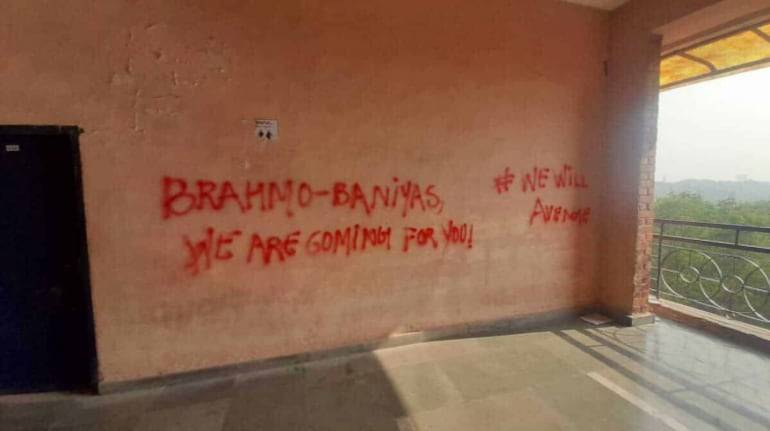
Violence is not merely brute and physical. Quite often, it is cultural and symbolic. And this sort of violence manifests itself in the act of stereotyping a religious/ethnic community, or a group of people with certain caste identities through prejudices and negative gestures. And it is sad that this violence is so deeply rooted in our collective psyche that even ‘educated’ people are not altogether free from it. Take, for instance, what happened in recent times in Bengaluru’s Manipal Institute of Technology. A professor, as a viral video indicates, compared a Muslim student’s name with Ajmal Kasab—one of the convicted terrorists in the 26/11 Mumbai terror attack. It was like denigrating the student’s religion; it was nothing but an act of stereotyping every Muslim as a potential terrorist. Think of the humiliation the student passed through in the classroom amid the presence of silent and passive classmates . ‘Being a Muslim in this country and facing all this everyday’, as he reminded his professor, ‘is not funny’. Even though the professor was heard of offering an apology, the fact remains that our classrooms, far from being truly dialogic, humane and symmetrical, often act as sites of symbolic violence—say, the silence imposed on a Dalit/marginalized student through the act of stereotyping her as someone belonging to a ‘non-meritorious’/ ‘reserved’ category; or, for that matter, seeing every Muslim girl wearing hijab as orthodox, conservative and potentially fundamentalist. Quite often, students as well as teachers tend to normalize and perpetuate this violence.
Likewise, in yet another incident in the Jawaharlal Nehru University, several walls on the campus were reported to be defaced with nasty slogans: ‘ Brahmins leave the campus’/ ‘Brahmins-Baniyas: we are coming for you’/’ There will be blood’. Yes, in a university like JNU characterized by hyper-political passions, it is not surprising that there are allegations and counter-allegations—the continual exchange of toxic words and symbols perpetuated by ‘rightists’ as well as ‘Left-Ambedkarites’. However, what is really tragic is that far from engaging in a sociologically sensitive and intellectually nuanced political debate, the university community is becoming increasingly toxic—a site of cultural/symbolic violence. For instance, in this case, it is like stereotyping every student/teacher who happens to be born in the so-called ‘forward caste’ as necessarily a blind follower of Manusmriti—an oppressor who can never change himself/herself. This act of stereotyping takes us nowhere; it destroys what liberating education ought to do—dialogue, critical reflection, faith in human possibilities, and a quest for collective emancipation.
In this context, as a teacher with deep interest in reflexive/critical pedagogy, I wish to raise three points. First, without the nuanced art of critical pedagogy, it is not possible to distinguish a structural issue from the easy game of stereotyping people. For instance, we ought to understand terrorism, or for that matter, religious fundamentalism as a socio-political question. Of course, there is something called terrorism in the world; and it is not impossible to see it as an attempt to restore ‘religious purity’ as defined by the orthodox priest craft, or initiate a ‘civilizational war’ against the onslaught of modernity, globalization and associated cultural symbols. We have seen this sort of terrorism in, say, Iran and Afganistan. Likewise, we have witnessed all sorts of fundamentalism—a non-hermeneutic/orthodox/monolithic notion and practice of one’s religious identity.
And with critical pedagogy, we must understand this phenomenon—its authoritarian/patriarchal seeds, its violent practices, or its location in a highly asymmetrical/uneven world. However, understanding, explaining and critiquing terrorism or religious fundamentalism is one thing, and stereotyping people on the basis of their faith and nationality is quite another. For instance, even if there is terrorism in the name of Islam, not every Muslim is a terrorist: the way not every Hindu is necessarily a proponent of militant Hindutva. Gandhi, to take a striking illustration, did not behave the way a Hindu fanatic does. And who can deny that there are innumerable Muslims amongst us who love Nizamuddian Auliya and Jalaluddin Rumi rather than the likes of Ayatollah Khomeini and Osama bin Laden. And, as the recent incident in Iran has revealed, there are Muslim women who can assert their democratic rights, fight for their freedom, redefine feminism, and resist the dictates of authoritarian fundamentalists. Did the concerned Professor in Manipal University forget this pedagogic art?
Second, as far as the caste question is concerned, it is important to distinguish the critique of casteism as an ideology, or a violent/hierarchical practice from a shallow/generalized judgment on everybody who happens to be born in the so-called ‘forward caste’. Every ‘forward caste’ professor/student need not necessarily be a casteist; instead, it may not be altogether impossible to find him/her participating in the movement for collective emancipation. Yes, JNU students must resist Brahminism as an oppressive ideology or institutionalized hierarchy—the way the likes of Jotirao Phule and Dr. B. R Ambedkar did. However, critiquing Brahminism, and asking all ‘Brahmins’ to leave the campus are two different things. To take an analogy, it is like saying that every white European was necessarily a colonialist, and, thereby, forgetting the humanistic aspirations of the likes of Charles Andrews and Romain Rollaind who were with Gandhi in his quest for decolonization.
And third, as students/teachers—particularly those who find themselves in privileged locations, we ought to be rigorously reflexive. Despite our political correctness, we might still carry inflated egos, and look at the deprived castes or marginalized religious communities with some sort of paternalism. This must go. Instead, as a feasible utopia, I would propose a dialogic learning community that encourages empathy, compassionate listening and dignified egalitarian relationships.
Avijit Pathak writes extensively on culture, politics and education.








